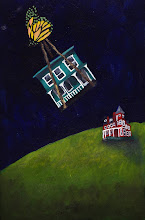
“You cannot really believe in anything until you are aware of the process by which you arrived at your position.” -Sufi teaching
Across the street from my parents’ house in the burbs, a neighbor—a peer of mine who settled in our hometown—just became a daddy. His son, Frederick R. is only a week old, but has quite a bit to live up to; he is in fact the seventh generation of sons named Frederick R. to join the ranks of his family.
It may seem quaint, old fashioned, or even outright garish to continue such a legacy of prenoms in today’s day and age of baby Skyes and Madisons, Hunters and Chelseas. Why saddle an infant with 250 years of family history before he’s even mastered his first baby Einstein disc? Quite the harbinger of individualism when your family tree keeps tripping on the root named Fred.
Interestingly, my typically forward-thinking father, often snarky in these matters of tradition, was of a different opinion altogether: jealousy. “How amazing to be able to trace your history back seven generations,” he told me. “Ours unravels after only 3.”
For us turn of the century Jewish immigrants (and I’m sure I speak for countless other cultures as well), our family history is one of disruption and relocation. My sister and I live in relative hipster comfort in Brooklyn and Manhattan respectively, having moved out of the parents’ quarter acre ranch of our childhood in upper-middle class Long Island. Before we were born, my mother grew up with her sister and single mother in a small apartment off Rockaway Parkway in Flatbush, with my father a bus ride across town in the Jewish/Italian neighborhood of Bensonhurst, Brooklyn. Dad’s family began there because his father, or Ukrainian descent, shipped himself across the ocean, fleeing the increasingly anti-Semitic grip of the Russian Tsar in 1912.
My grandfather’s parents saw the writing on the wall. Joseph, a carpenter, and Ida (whose parents owned a mill) lived forty miles south of Kiev. Their four children had little in the way of upward mobility in front of them, as college or even high school were off limits to Jews. My great uncle once recalled a walk home with a Rabbi and a group of Hebrew students, by lamplight, being tense and terrifying as the thuggish Cossacks were known to menace Jews with words or swords without reason or warning. Joseph sailed to Manhattan Island, and after two years of working and saving, finally sent steerage class tickets for the family to join him. Goodman, my grandfather, was 3. Never assigned a birth certificate, and he arbitrarily picked September 1st as his birthday.
From there the story takes on its familiar PBS documentary storyline. Sepia photographs, struggle, cold, and coal, blissfully ignorant cigarette smoking, stickball, pickles, and progress. Undoubtedly Joseph gained a life for his family—literally and figuratively—which could not have unfolded had he remained in his homeland to bear Joseph the IInd or IIIrd (let alone the VIIth ).
The hidden sacrifice in his story is a common theme for almost all displaced immigrants and terrorized religious groups. Generations of history, amputated to save a family at the world’s mercy, are phantom limbs we are learning to live without. And how sad that in a world flooded with Facebook and Twitter updates, so much important real information has drifted from our reach. We tend to put off digesting our own histories with the mindset that they will always be there, while history has shown us time and time again how unstable the memory of our legacies really are. We are all too quick to snap up the 2nd or 3rd generation iPhone, while our own generations fade.
Dad recently forwarded an email to our extended family with a three-page word document attached. He had written down the most detailed version of our family’s story he could hunt/gather, and passed along the challenge for others to add their own branch’s details. I’ve promised myself that I will document my own generation’s details when the time comes but who knows if it will root and flower or wither on someone’s blog and dry out as well (“…but that, honey, was when there were no CerebrochipsÒ to store information, and everything just sat there in the world wide web…”).
Rohinton Mistry, a Canadian author of Indian descent and astounding talent, writes, “Everyone underestimates their own life…In fact, no matter where you go in the world, there is only one important story: of youth, and loss, and yearning for redemption. So we tell the same story, over and over. Just the details are different.”
Take a moment to reflect on the richness of your own arrival. Even if you have no Frederick R. the VIIth on your horizon, at least you can fill out the profile of his avatar.
-JESSE NEUMAN





No comments:
Post a Comment